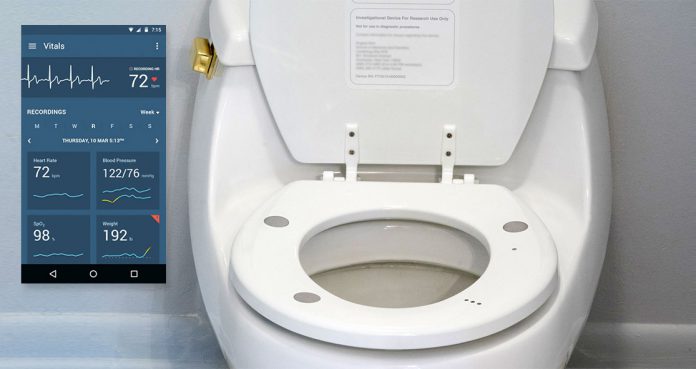The innovative new bathroom system is making hospital’s task easier to monitor patients with the condition of congestive heart failure from their own homes, considering the rising number of new cases of it with around 1 million cases every year.
A team of Rochester Institute of Technology researchers developed a toilet-seat based cardiovascular monitoring system in order to lessen another chance of hospital admittance rates of patients showing congestive heart failure problem.
The toilet seats, which will be made available by the researchers’ company ‘Heart Health Intelligence’ (HHI) through the FDA clearance procedure. Hospitals would purchase them and issue after discharge to heart failure patients.
It is specially equipped to monitor blood pressure, heart rate, the patient’s weight, blood oxygenation levels, and stroke volume. The stroke volume is the amount of blood pumped out of the heart at every beat. It can also measure the electrical and mechanical activity of the heart.
Algorithms used with machinery are used to analyze the data, and to alert advanced heart treatment providers of a deteriorating condition of a person. The cardiologists will then conclude if intervention is necessary based on the report made available. Simple interventions such as a drug change or short visit to the office instead of admission to the hospital are possible.
Nicholas Conn, a postdoctoral fellow at RIT who is also a founder and CEO of Heart Health Intelligence, has played an important role in the university team of developing the toilet seat project. He even looked for publishing the studies after its accomplishment.
Conn said, “Typically, within 30 days of hospital discharge, 25 percent of patients with congestive heart failure are readmitted. After 90 days of hospital discharge, 45% of patients are readmitted – and the Centers for Medicare and Medicaid Services are penalizing hospitals for readmitting patients for heart failure.”
CEO of ‘Heart Health Intelligence’, Conn, further explains that the penalty for readmitting 150 patients is nearly $500,000 per year, considering the national average for readmission rates. It is huge compared to the overall cost of providing own monitored toilet seats to 150 patients. Hospitals will tend to use life-saving tools.
Conn also commented, the toilet product will notify the deteriorating conditions even before the person realizes the symptoms. Earlier this year, after joining RIT’s venture creations business incubator, HHI is now focused on the further movement of the product. The team of researchers also writes grants for additional networking and funding, human-subject testing and on-going pre-clinical studies. Conn and his team are working on FDA approval for the product and its roll-out throughout the country.





















